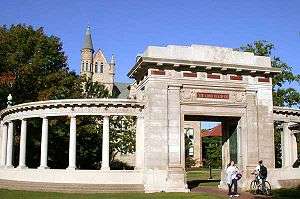S. Frederick Starr
Stephen Frederick Starr (born March 24, 1940) is an American expert on Russian and Eurasian affairs, a musician,[3] and a former college president, having served as president of Oberlin College for 11 years.
S. Frederick Starr | |
|---|---|
| 12th President of Oberlin College | |
| In office July 1983[1] – June 1994[2] | |
| Preceded by | Emil Danenberg |
| Succeeded by | Nancy Dye |
| Personal details | |
| Born | Stephen Frederick Starr March 24, 1940 |
| Education | Yale University (B.A.) Princeton University (Ph.D.) |
| Profession | Russian and Eurasian affairs expert, historian, musician |
Founder and chairman of the Central Asia-Caucasus Institute, he is fluent in Russian and is the author or editor of 20 books and more than 200 articles on Russian and Eurasian affairs.[4] Starr's expertise is in Afghanistan, Central Asia, the Caucasus, Russia, and the rest of the former Soviet Union. He focuses on developing nations, energy and environment issues, Islamic faith, culture and law, and oil politics.
Starr has advised three U.S. presidents on Russian/Eurasian affairs and chaired an external advisory panel on U.S. government-sponsored research on the region, organized and co-authored the first comprehensive strategic assessment of Central Asia, the Caucasus and Afghanistan for the Joint Chiefs of Staff in 1999. He joined the American Foreign Policy Council as a Distinguished Fellow for Eurasia in January 2017.
Biography
Academic career
He was born on born March 24, 1940. Starr earned a bachelor of arts degree at Yale University in 1962 and his Ph.D. in history at Princeton University. He also studied at the University of Cambridge, UK, Kings College.
He began work as an archaeologist in Turkey and in 1974[5] started the Kennan Institute for Advanced Russian Studies, which opened U.S. research contact with Central Asia. He served as vice president of Tulane University from 1979–1982,[5] as well as its vice provost from 1980–1981.
Starr served as the 12th president of Oberlin College from 1983–1994. Despite increasing minority hiring,[6] Starr's presidency contained clashes with students over such issues as divestment from South Africa and the dismissal of a campus minister,[6] as well as his desire to turn Oberlin into "Harvard of the Midwest."[7] After a clash with students on the front lawn of his home in April 1990,[7] Starr took a leave of absence as president from July 1991–February 1992.[6] He resigned in March 1993, effective to June of that year.[6] After leaving Oberlin, he was president of the Aspen Institute[6] from 1994–1996.[5]
Criticism
Journalist Ken Silverstein has dubbed Starr "The Professor of Repression" due to his support for corrupt despotic regimes in the Caspian region.[8] Similarly, a book on the 2008 Georgian-Russian war co-edited by Starr was criticized for lack of impartiality.[9]
Musician
In 1980 Starr, a jazz clarinetist, co-founded the Louisiana Repertory Jazz Ensemble while serving at Tulane. Its members dedicate themselves to preserving the raucous pre-1930 jazz of New Orleans. The band has performed across the United States. It gave the Doubleday Lecture at the Smithsonian Institution in March 1983, toured France and the Soviet Union, and made national television appearances in Italy, Japan and Sweden. Jazz historian Al Rose once called it "the most authentic band on the scene today".[10] The Ensemble's albums include Alive and Well (1981), Uptown Jazz (1984) and Hot & Sweet: Sounds of Lost New Orleans (1986).
Publications
- Decentralization and Self-Government in Russia, 1830-1870. Princeton University Press, 1972. ISBN 0-691-03090-1
- Melnikov. Solo Architect in a Mass Society. Princeton University Press, 1978. ISBN 0-691-03931-3
- With Hans von Herwarth Against Two Evils: Memoirs of a Diplomat-Soldier During the Third Reich, Collins, 1981. ISBN 0-89256-154-8
- Red and Hot. The Fate of Jazz in the Soviet Union 1917-1980. Oxford University Press, 1983 ISBN 0-19-503163-6.
- "A Usable Past" in Alexander Dallin and Gail S. Lapidus, eds. The Soviet System: From Crisis to Collapse, 2nd. revised edition. Westview Press, 1995. ISBN 0-8133-1876-9, pp 11–15
- Edited with Svante E. Cornell. The Guns of August 2008: Russia's War in Georgia, M.E. Sharpe, 2009. ISBN 978-0-7656-2507-6
- Lost Enlightenment: Central Asia's Golden Age from the Arab Conquest to Tamerlane. Princeton University Press, 2013. ISBN 978-0-691-15773-3
References
- "Presidents of Oberlin College". Oberlin College Archives. Oberlin College. Archived from the original on 21 October 2013. Retrieved 21 October 2013.
- "S. Frederick Starr Presidential Papers". Oberlin College Archives. Retrieved October 8, 2014.
- "S. Frederick Starr papers". New York Public Library Archives & Manuscripts. Retrieved October 8, 2014.
- S. Frederick Starr, Ph.D," Archived 2009-03-26 at the Wayback Machine Paul H. Nitze School of Advanced International Studies at Johns Hopkins University website. Accessed Dec. 16, 2013.
- "Dr. S. Frederick Starr," Archived 2016-01-13 at the Wayback Machine Institute for Security & Development Policy website. Accessed Nov. 4, 2015.
- "2/12 - S. Frederick Starr (1940- )," Archived 2015-05-07 at the Wayback Machine Oberlin College website. Accessed Nov. 5, 2015.
- Foss, Sara and Miller, Hanna. "Pomp and circumstances: Nancy Dye's first four years," Oberlin Review (May 22, 1998).
- Silverstein, Ken. "Academics for Hire", Harper's Magazine (May 2006)
- Bruckner, Till. "Book Review: The Guns of August 2008" Caucasian Review of International Affairs, winter 2010". cria-online.org.
- "Louis Armstrong Centennial Conference: Biographies of Participants". Satchmo.com. Archived from the original on September 24, 2015. Retrieved October 8, 2014.
